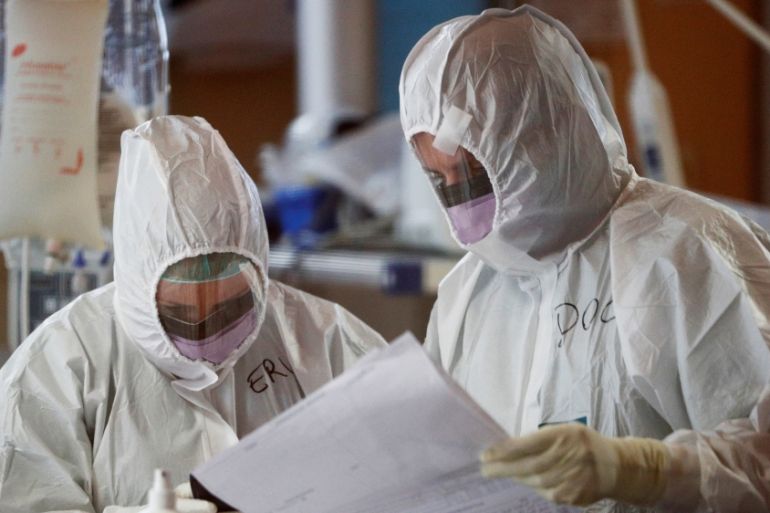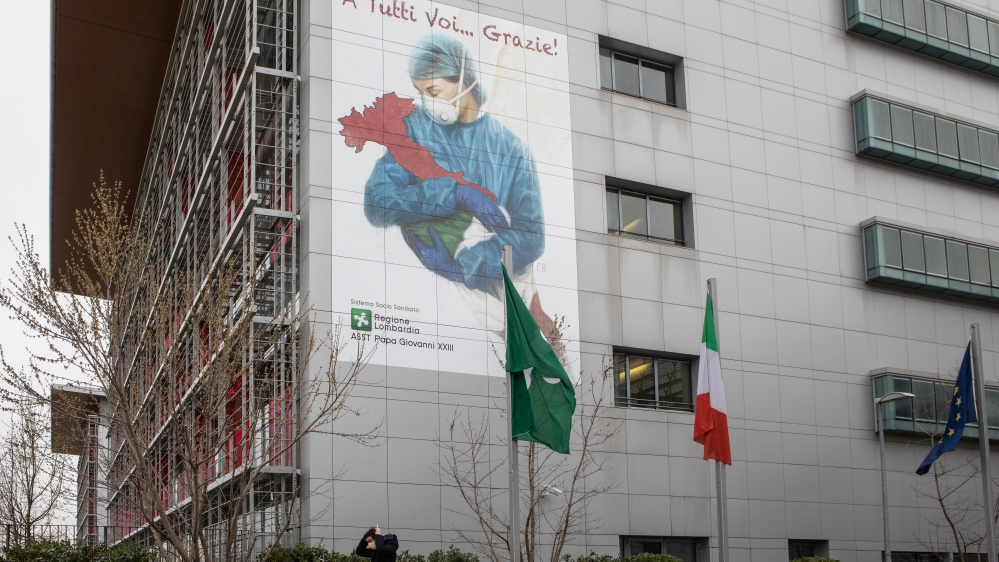Fears grow for Italy’s non-coronavirus patients at back of queue
As hospitals are restructured to prioritise infected Italians, others including cancer patients must wait for treatment.

As the coronavirus crisis escalates, patients with non-urgent care needs are being pushed further back, and the impact of limited access to healthcare over the peak months of the pandemic could be felt for months after it ends.
In Cremona, a city in Lombardy, the northern Italian region that has become the centre of the global pandemic, one hospital’s oncology department is among the few still operating for cancer patients in need of hospitalisation.
Keep reading
list of 3 itemsItaly shuts down more industries, but critics say it’s not enough
Coronavirus: Why so many deaths in Italy?
But the delays they experience may prove dangerous in the long term.
“The entire hospital except for the oncology, paediatrics and haematology departments has been turned into Covid wards,” Rodolfo Passalacqua, the director of the oncology department at Cremona hospital told Al Jazeera, referring to COVID-19.
“This includes key specialities like surgery, neurosurgery and cardiology. Wherever possible, we try to rely on nearby clinics, but there are certainly delays in both diagnosis and surgery [for cancer patients].”
|
|
According to Passalacqua, Cremona hospital used to perform around 30 surgical treatments a week on cancer patients, aimed at either removing tumours or a sample tissue for diagnosis, as well as other diagnostic procedures necessary before chemotherapy or other treatments.
“We used to treat four or five patients with stomach cancer each month, eight to 10 with colon cancer. It is not clear what is happening to these at the moment,” Passalacqua said.
“This decreases their chances of recovery. It is difficult to quantify, but in cases where surgery is needed to treat the cancer, delaying it for one or two weeks makes little difference, but months of delay could be harmful for the patient. The same goes for screening.”
Fear of infection
In Lombardy, another 293 people who had contracted coronavirus died between Tuesday and Wednesday.
The region accounts for more than half of Italy’s 7,503 fatalities.
Saverio Cinieri, the acting director of the Italian Association of Medical Oncology (AIOM), said his “first concern” was with surgical diagnostics.
“In the areas most under pressure [in Italy], operating rooms have become departments providing pneumological support,” he told Al Jazeera, adding that many of the ventilators used in operating theatres have been redirected towards pneumatology or intensive care departments caring for COVID-19 patients with severe respiratory problems.
According to a study in The Lancet, cancer patients in China tended to be more vulnerable to coronavirus.
Other research shows a similar correlation between cardiovascular disease and coronavirus.
While some experts say there is not enough evidence, the majority of coronavirus victims were found to have one or more pre-existing conditions.

Meanwhile, health authorities across Europe are advising against hospitalising patients with other illnesses where possible, due to the risk of contagion in medical facilities.
“There are situations where these patients do not receive the same level of care they normally would, because going to a hospital means they are more exposed to the risk of getting ill, and therefore it is not recommended,” Cinieri said.
“This is an indirect problem, not attributable to the coronavirus itself but to the difficulty of maintaining a good quality public service with a pandemic unfolding.”
Cinieri estimated that once the pandemic reaches its peak in Italy, the health system will need up to six months to recover.
Aldo Pietro Maggioni, the director of the National Association of Medical Hospital Cardiologists (ANMCO) in Italy, explained: “In Lombardy, hospitals are overwhelmed and several intensive care beds, generally dedicated to cardiovascular problems, have been transformed into beds for COVID-19 patients.”
He added that many patients are also more reluctant to go to the hospital due to fear of infection.
“Patients with myocardial infarction (heart attack) or heart failure arrive later,” said Maggioni, who is also a member of the European Society of Cardiology.
“They try to avoid [going] to the emergency room, overcrowded by patients with suspected COVID positivity. In this way, when they finally arrive, the clinical conditions are more severe.”
On Monday, medics at Cremona hospital started providing home visits to cancer patients, and have set up a dedicated helpline.